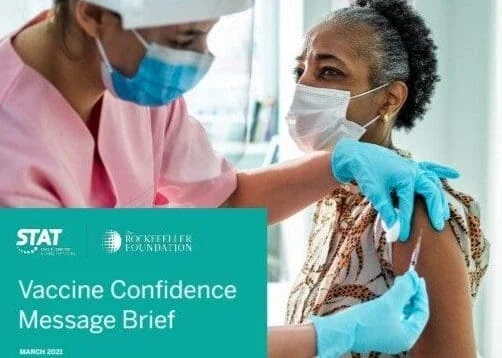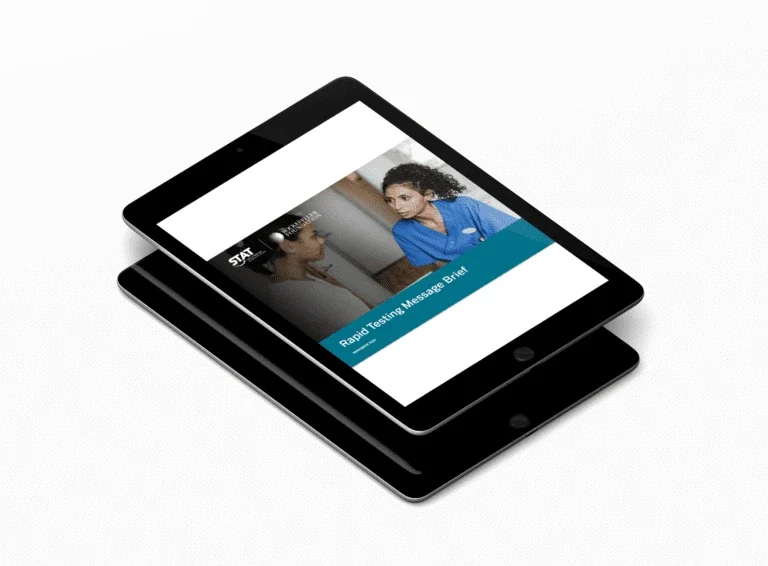Our Mission
In order to end the pandemic, we had to work together. That’s why Governors in both parties joined the State and Territory Alliance for Testing (STAT) to learn from each other’s experiences fighting Covid-19. Together, they deployed rapid tests where they were needed most, helped to reopen schools, and made sure everyone in the U.S. had access to and confidence in vaccines.
What We’re Doing: States and territories in the State and Territory Alliance on Testing met regularly to exchange best practices, learn from each other about advances in Covid-19 testing and vaccination management, and listened to experts and federal officials preview innovative testing and vaccine strategies.
Governors in STAT also used their joint purchasing power to encourage manufacturers to ramp up the production and delivery of rapid Covid-19 tests at lower prices. States leveraged STAT to purchase millions of rapid tests, which went straight to schools, nursing homes, and other public settings on the frontlines of the pandemic.
- 6million
tests have been purchased by participants
- <30states
dedicated to ramping up Covid-19 testing to reopen communities
- ~25%reduction
in rapid test prices for participating states
Building on the momentum of its work on testing, STAT expanded its focus to include vaccine administration and reopening K-12 schools.
Vaccine Action Network
The Vaccination Action Network brought together Covid-19 task force directors, state vaccine leads, and senior public health officials to solve the toughest challenges states faced when getting shots into arms. This included:
- Sharing lessons on eligibility, scheduling appointments, allocating vaccines, distributing vaccines in an equitable manner, and communicating with the public
- Meeting regularly to troubleshoot new vaccine distribution challenges
- Bringing in representatives from the Biden administration, including White House Senior Advisor for Covid-19 Response Andy Slavitt, Covid-19 Advisory Board Member Loyce Pace, and leading epidemiologists such as Dr. Paul Offit to speak to challenges facing states
- Spotlighting success stories, such as West Virginia’s vaccination messaging strategy and North Carolina’s progress on vaccine equity
K-12 Action Network
The K-12 Action Network brought together state education officials, senior public health officials, and Covid-19 task force directors to address the operational challenges faced by STAT members in reopening schools. This included:
- Sharing insights on school testing, working with teacher associations, catching up on learning time, maintaining extracurricular activities, and fostering parent/teacher communications
- Bringing top education leaders, including former Education Secretary John King and American Federation of Teachers President Randi Weingarten, to speak on key policy and programmatic developments and respond to state questions
- Hosting experts to provide guidance to states on operational challenges like improving ventilation
- Spotlighting success stories, such as Utah’s Test to Play & Test to Stay strategies and Chicago Public School reopening and labor agreement
Communications Community of Practice
Even the most detailed strategies depend on motivating people to participate. To that end, the STAT Communications Community brings together public health communicators both inside and outside of states to share insights, by:
- Conducting tracking studies and focus groups to measure changes in public attitudes
- Providing message guidance on pressing challenges like vaccine confidence, testing and contact tracing
- Hosting bi-weekly webinars with experts from academia, audience research, advertising, and clinical care to share success stories and lessons learned
- Creating tailored content for social media and providing hands-on help to STAT participants and others as they navigate new communications challenges
Success Stories
Quick Procurement and Distribution of Tests
The Rockefeller Foundation dedicated up to $30 million for an Advanced Market Commitment to a large medical supply distributor to enable the procurement, purchase, stocking, sale, and distribution of an array of rapid Covid-19 tests. This commitment drove efficiency, facilitated volume discounts for STAT members, and gave manufacturers confidence in demand. Further, it ensured that the right tests were getting to the right people at the right time to protect the health and safety of the most vulnerable populations.
Updates on Latest Testing Technologies
To ensure member states were up to speed on the latest cutting-edge developments, STAT procured multiple briefings from companies participating in NIH’s RADx (Rapid Acceleration of Diagnostics) initiative. RADx helped to scale up the production of tests by identifying and selecting companies with promising technologies. These behind-the-scenes briefings ensured that STAT members are ready to take advantage of testing innovations as soon as they were ready for use.
Building On Success
Founded by 10 charter states in August, STAT had more than tripled to more than 30 participants. As more states and territories participated, they only increased their leverage for test purchases, enabling better prices and quicker delivery. This also enriched the exchange of best practices and key learnings that could be replicated across state lines.
Constant Collaboration
Since August 2020, STAT members had weekly discussions to learn from each other’s experiences. They shared challenges and success stories for deploying and distributing tests where they were needed most–including the schools and workplaces whose safety was crucial to controlling the coronavirus. These conversations helped public health officials refine the best approach for their state or territory.
Partners
To keep members in constant contact with organizations and agencies on the frontlines of the pandemic response, STAT formed working relationships with:
- National Governors Association
- Rapid Acceleration of Diagnostics (RADx) Initiative at the National Institutes of Health
- Department of Health and Human Services
- Duke-Margolis Health Policy Center
- Biomedical Diagnostics program at Arizona State University
State Spotlight
Kicking Off School Sports Safely
States shared lessons on how to implement safe policies for re-starting school sports, including strategies for changing masks during breaks and timeouts.
Cutting Through Red Tape
After learning about a new approach during a STAT presentation, multiple states vastly streamlined their approval process for conducting rapid antigen tests in schools, cutting through red tape and eliminating the need for thousands of individual regulatory approvals.
Sharing Lessons On Equity
Multiple states revised their vaccine distribution policies after hearing examples of how other states had improved equitable distribution in communities of color.
Finding Digital Solutions to Scale Testing
After a STAT briefing from the U.S. Digital Service, one STAT member quickly deployed a new digital platform to increase the number of facilities undertaking antigen testing.
Massachusetts
Massachusetts successfully rolled out symptomatic K-12 testing; test supply was a major challenge to widespread asymptomatic screening. Massachusetts operationalized Phase 1 of its BinaxNOW Rapid Point of Care Covid-19 Testing for K-12 Schools in November 2020 with a group of about 150 interested public school districts, charter schools and approved special education schools providing any form of in-person instruction.

The state recommended testing students and staff who were showing Covid-19 symptoms fully or partially. Participating districts and schools were required to obtain CLIA waivers, received test kits at no cost, and in most cases, administered the test using existing staff resources. Having conducted a validation study of the Abbott BinaxNOW test that confirmed very high specificity in both adults and children and very high sensitivity in newly symptomatic adults, Massachusetts planned to conduct an additional study focused on the sensitivity of BinaxNOW for asymptomatic children. Massachusetts cited lack of test supply as a major challenge in any attempt to conduct widespread asymptomatic testing in a K-12 setting.

Texas
Texas took bold steps to secure a statewide CLIA waiver, clearing the way for testing at 10,000+ campuses. Texas rolled out screening tests on an opt-in basis for its K-12 populations using Abbott BinaxNOW tests in two ways: targeted for staff and students who present symptoms of Covid-19 while on campus; and screening for staff at frequencies contingent on the Covid-19 hospitalization rate within each school’s Trauma Service Region (<7%, every 4 weeks; 7-15%, every 2 weeks; >15%, every week).
All testing is free, administered by individuals who have complied with training requirements provided online, and is conducted on a voluntary basis with permission slips required for students under 18 years of age. Schools had discretion over the use of tests for extracurricular activities but could not mandate the testing of any staff or student. Uniquely, the Texas Division of Emergency Management (TDEM) obtained a statewide CLIA waiver which allowed for testing at all locations including school systems across the state, negating the need for schools to obtain their own individual waivers. A standing delegation order for testing was also issued to ensure school nurses could participate in compliance with state nursing board requirements. All necessary PPE was distributed with the test cards on a monthly basis and a custom mobile application was developed and provided to comply with state reporting requirements. The Texas Education Agency (TEA) co-sponsors the program and promotes participation. The program is currently available to ~6M students and staff in 10,000+ public and private campuses across all 254 counties in the state. As of early December 2020, ~20% of potential sites requested the testing assets which lead to the distribution of more than 1 million tests with additional schools opting-in daily.
Utah
Utah’s early success in screening extracurricular activities led to broader screening for the K-12 population. Utah rolled out a “Test to Play” strategy for the asymptomatic screening of students participating in extracurricular activities at the high school level. Testing was undertaken every two weeks and a negative test was required for practice or competition in extracurricular activities. Utah was piloting a “Test to Stay” strategy in several school districts, extending asymptomatic screening to the state’s broader K-12 population.

School testing teams had been assigned the responsibility to administer, manage, and report tests and put into place positivity thresholds for school closures. If any school hit the threshold, the school either went online for two weeks or offered to test all students if the school continued to offer in-person learning.

Illinois
Illinois found K-12 testing valuable for essential workers, at schools in lower-income and rural communities. Illinois piloted K-12 Rapid POC testing using Abbott BinaxNOW with 8 districts comprising 40-50 schools. The state provided schools with discretion on the targeting and frequency of testing, leading to a range of approaches including symptomatic; symptomatic+; and weekly screening regimens.
All such approaches were viewed positively by the state, providing a meaningful level of risk mitigation and allowed schools to remain open. K-12 testing had particularly well received in rural communities where testing sites were further away, by parents who are essential workers, and at schools in lower-income areas. Illinois is planning to roll the program out to another 40 school districts.
Maryland
Maryland’s archetype study put testing approach in the control of schools; lessons to inform broader rollout in 2021. Maryland had operationalized an Early Adopter Program with nine K-12 schools with varying sizes, demographics and residential programs. The approach was to undertake screening and confirmatory PCR testing of asymptomatic positive POC tests as well as negative POC tests if there was known exposure or symptoms present.

Like Illinois, Maryland had left it up to the schools to determine what worked best for their population in terms of frequency of testing. The goal of the Early Adopter Program was to capture lessons before rolling out to a broader set of districts in 2021.
Expanding
The Alliance
Every state in the country had spent time learning how to fight Covid-19—and how not to. The more states joined STAT, the faster we learned from each other’s experiences and crafted the strategy worked best for each state. Growing the alliance also motivated manufacturers to produce more tests—and give governors more leverage to get a better deal.

Vaccine Confidence Message Brief
In order to get Americans vaccinated quickly, we needed to understand the motivations and hesitations behind getting vaccinated. We launched the Vaccine Confidence Message Brief to explore what motivates high-priority audiences to get the Covid-19 vaccine.
read the message briefWhy Rapid Testing?
Rapid tests provide results in as little as 15 minutes, so people can protect those around them before it’s too late—instead of spending days worrying if their loved ones are at risk. Regular rapid testing is inexpensive, and can create an early warning system to stop outbreaks before they spread. It’s the only way we’ll be able to reopen schools, workplaces and other public settings while protecting the frontline workers who have spent months protecting us.
read the report
